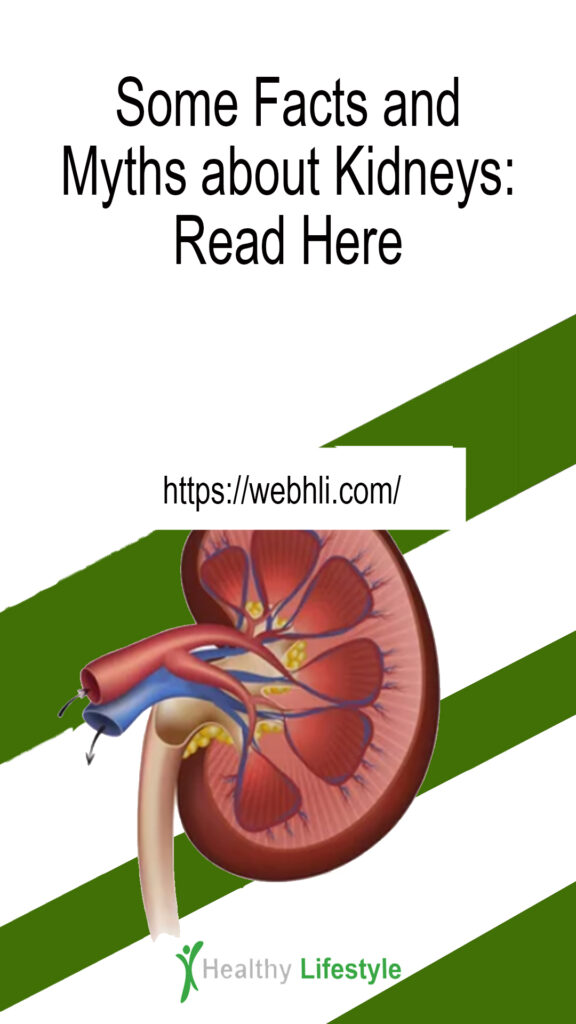
Myth: Kidney diseases cannot be cured
Fact: Your kidneys are safe if given timely treatment. However, some kidney problems are progressive and may even cause end-stage renal failure.
Myth: I don’t have any problem which means that I am all right
Fact: Most of the kidney diseases do not show any symptoms or signs. But those who have high risk-factors should visit the doctor annually for the checkup.
Myth: My kidneys are healthy as I pass a lot of urine
Fact: Some kidney diseases cause low urine output (<400 ml urine/day) while in some it may go up to 3000 ml/day. Even with more urine production waste materials like urea, potassium, acids etc may not be excreted resulting in kidney failure or other diseases.
Myth: Drink more water to keep your kidneys healthy which is also the best treatment for kidney diseases
Fact: Drink 2-3 liters of water which may avoid the formation of stone and other urinary tract infections. If you drink the water when your kidneys have failed, it may result in poor control of hypertension or water in the lungs. Follow your doctor’s advice in such a case.
Myth: I don’t require continuing my kidney treatment because I am fine now
Fact: With proper therapies, many patients with chronic kidney disease may feel well and might want to end up eating the medicines or treatment. But any discontinuation can be risky as it may worsen the functioning of your kidneys needing kidney transplantation or even dialysis.
Good Energy Food for Diabetics
10 Simple Food Concepts Every Person Living With Diabetes Should Know
Making Cheesecake For Diabetics
Enjoy the Taste and Benefits of Diabetic Foods
Will The Mulberry Leaf Help Your Diabetes?
5 DIABETIC FRIENDLY SALADS Some Tasty
DIABETIC LEMON COCONUT COOKIES Some Tasty
50 Healthy Diabetic Recipes That Are The Best
Myth: You need kidney dialysis for life long
Fact: Acute kidney failure can be treated and one may need dialysis for a short period until the kidney recovers completely. However, delay in dialysis can be risky. In end-stage kidney failure, the patient requires lifelong dialysis if they reject going for transplantation.
Myth: Kidney failure is when your one kidney fails
Fact: No, your kidney failure is when both of your kidneys fail. In most cases, you may not feel any type of problem if your one kidney fails. But when both of your kidneys fail, toxins start accumulating in your body and the increased levels of creatinine and blood urea nitrogen indicate it.
Myth: Edema in kidney tells about kidney failure
Fact: In some kidney diseases, edema is there but there may be no effect on the functioning of your kidney. Edema is only one of the common causes of kidney disease.
Myth: Males have kidneys situated in a sac which is between the legs
Fact: Kidneys are located in the upper part of the abdomen with the same functions, shape, and size. The sac contains testes (male reproductive organ) which are situated in between the legs.
Check out these related articles, too:
What You Should Look Out For For Kidney Failure Symptoms?
Kidney Failure Treatment Without Dialysis
Kidney Diet Secrets That Can Reverse Chronic Kidney Failure
The Effects of High Potassium For Kidney
What Is A Healthy Kidney Diet Plan
Diet Tips For People With Diabetes and Kidney Disease
Are Renal Insufficiency And Kidney Failure The Same Thing
5 Natural Supplements For Chronic Kidney Disease
Bitter Melon Recipe For Diabetes
Myth: Swelling of your body is the symptom of kidney failure
Fact: Swelling of the body may occur due to other diseases like heart or liver problems. However, swelling can be seen in kidney diseases too but does not necessarily signify a kidney problem. The loss of protein in urine can cause kidney failure if not treated on time.
Myth: Kidney donation is impossible across genders
Fact: If the blood group matches, males and females both can donate their kidney to the one in need.
I am sure most of your myths about the kidneys have now been corrected.
Source: Free Guest Posting Articles from ArticlesFactory.com

 Protected by Patchstack
Protected by Patchstack